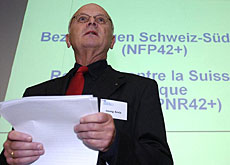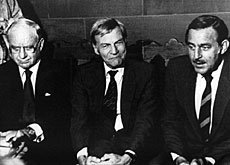Money trumped human rights for Swiss

Switzerland considered trade freedom to be more important than human rights in its dealings with the apartheid regime in South Africa.
This is the conclusion of research findings published on Thursday by the Swiss National Science Foundation. The government refused to comment on the findings.
“Relations between Switzerland and South Africa”, carried out by Bern University historian Peter Hug, is the last of ten reports into the issue commissioned by the foundation.
It reveals that Swiss connections to South Africa were closest during the 1980s, at the height of human rights abuses and repression of the black resistance movement by the white minority.
These military, intelligence service, armaments industry and nuclear relations were closer than previously thought.
The Swiss authorities at the time justified their involvement with Pretoria by arguing that South Africa was a bastion against communism.
But Hug says that while Switzerland’s decision not to apply international sanctions against South Africa benefited the apartheid regime in Pretoria, it did not extend its existence.
The Swiss government welcomed the report on Thursday, saying it was an important contribution to understanding the historical relations between the two countries.
However, the government did not comment on the report’s contents.
Swiss hypocrisy
Although the Swiss at the time condemned apartheid in theory, in practice they refused to do anything about it, the historian says.
They ignored international sanctions imposed by the United Nations, and Swiss industry found ways to get around the UN arms embargo.
Swiss industry even violated rules on arms exports defined by Switzerland. The Swiss authorities knew about many illegal deals but turned a blind eye to them – supporting some of them actively or criticising them only half-heartedly.
The report did, however, have a good word for the “Programme of Positive Measures”, which the Swiss government launched in 1986.
This was intended to improve the quality of life for the black and coloured population and promote contact between whites and blacks with a view to life after apartheid.
Access denied
In 2000 the Swiss government charged a team of 40 researchers with examining economic ties, contacts between churches, the international context, the public perception of the policy towards Pretoria and Switzerland’s attitude towards UN sanctions.
The team was led by Georg Kreis, president of the Swiss National Science Foundation and president of the Federal Commission against Racism.
Peter Hug said the research process, which had a federal budget of SFr2 million ($1.57 million), had been fraught with difficulties.
In April 2003 the government blocked access to the apartheid-era archives, which named Swiss businesses.
It said the decision was taken to protect Swiss companies facing class-action lawsuits in the United States brought against major multinationals by apartheid victims.
The case, which named banks UBS and Credit Suisse as well as food giant Nestlé, was thrown out in 2004.
swissinfo with agencies
“Relations between Switzerland and South Africa” is one of ten reports commissioned by the Swiss National Science Foundation to look at relations between Switzerland and South Africa.
The research should have been completed by 2003, but the work was delayed by a government decision to limit access to archives.
A study carried out by Bern University historian Peter Hug for the Swiss National Science Foundation has focused on military, arms industry and nuclear relations between Switzerland and South Africa.
The study reveals that the Swiss arms industry violated Swiss law and a UN arms embargo against South Africa during the 1960s and 1970s.
It says Swiss companies were involved in the apartheid regime’s secret nuclear weapons programme to build nuclear bombs using enriched uranium.
It also alleges that the Swiss secret service had long-standing ties with South Africa and was involved in the arms trade.

In compliance with the JTI standards
More: SWI swissinfo.ch certified by the Journalism Trust Initiative











You can find an overview of ongoing debates with our journalists here . Please join us!
If you want to start a conversation about a topic raised in this article or want to report factual errors, email us at english@swissinfo.ch.